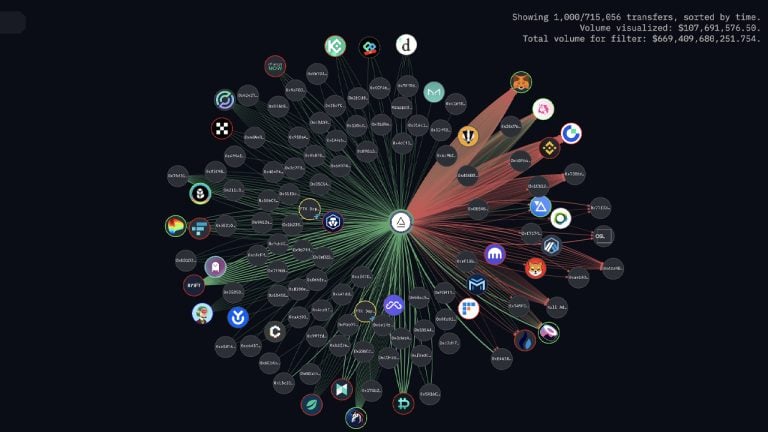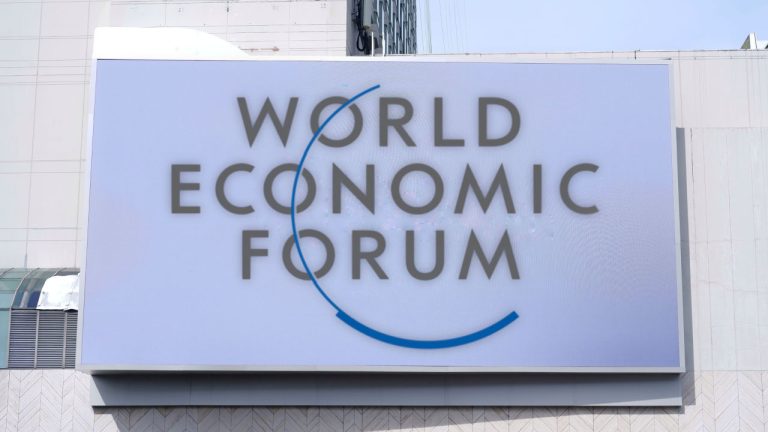 This week, FTX debtors issued a press release and a 20-page document noting that bankruptcy administrators had located $5.5 billion in liquid assets. The document details that investigators discovered fiat currencies, crypto assets, and securities as part of FTX’s and Alameda Research’s cache. However, the disclosure to unsecured creditors does not mention the extremely large […]
This week, FTX debtors issued a press release and a 20-page document noting that bankruptcy administrators had located $5.5 billion in liquid assets. The document details that investigators discovered fiat currencies, crypto assets, and securities as part of FTX’s and Alameda Research’s cache. However, the disclosure to unsecured creditors does not mention the extremely large […] The World Economic Forum (WEF) has announced the rollout of the Global Collaboration Village, its own metaverse platform, for this year. Klaus Schwab, chairman of the WEF, plans to leverage this representation of Davos to allow people and leaders to meet in virtual worlds and coordinate global collaboration efforts efficiently. WEF to Promote Metaverse-Based Collaboration […]
The World Economic Forum (WEF) has announced the rollout of the Global Collaboration Village, its own metaverse platform, for this year. Klaus Schwab, chairman of the WEF, plans to leverage this representation of Davos to allow people and leaders to meet in virtual worlds and coordinate global collaboration efforts efficiently. WEF to Promote Metaverse-Based Collaboration […]
A panel of experts at the 2023 World Economic Forum highlighted how the metaverse could deliver practical use cases of large-scale industrial industries like healthcare and retail.
The metaverse continues to be a central talking point among leaders and decision-makers in global industries. For many, the vision of the future of the metaverse is not limited to a gamified version of reality.
At the World Economic Forum (WEF) 2023 in Davos, Switzerland, a panel of experts came together to discuss a global idea of an industrialized metaverse. With echoes of the industrial revolution, the industrialized metaverse will bring Web3 technologies into industries that are at play in everyday life.
The “Deployment in the Industrialized Metaverse” discussion started out with Abdullah Alswaha, the minister of communications and information technology in Saudi Arabia, expressing that the current reality of digital engagement doesn’t match up to its potential.
“The digital world that we live in today is not fit for purpose in the 21st century.”
Instead, it could, and arguably will be better off, leveling up the current digital communications for situations such as telework. Alswaha continued:
“I’m a big advocate of the metaverse that it’s going to be the next wave of how immersive experiences work for consumers, enterprises, and the industry.”
Peggy Johnson, the CEO of augmented reality company Magic Leap, said the industrial metaverse would only come into play when digital and physical worlds begin to merge:
“That’s when it really comes to life and brings true productivity in these industrial environments.”
Åsa Tamsons, the senior vice president and head of business area technologies at Ericsson, said this technology is already at play with big use cases in the healthcare, automotive and consumer electronics industries.
Another example was in retail onboarding:
“Huge retail and consumer goods companies are working on how to use this metaverse technology to improve and shorten the time for employee onboarding and training.”
When explicitly asked about metaverse technology in real-time situations in the healthcare industry, the CEO of Siemens Healthineers, Dr. Bernd Montag, said that although there are use cases, healthcare needs more time to catch on.
He clarified why the healthcare industry might be seen as being behind digitally.
“It is that you want to have ultimate safety. You want to have ultimate trust. This is sometimes harder to solve and that is why the adoption also doesn't come in with a big bang.”
However, he did mention that the shift to augmenting surgery with 3D is happening, albeit “very gradually.”
Related: Metaverse to possibly create $5T in value by 2030: McKinsey report
Both Tamsons and Johnson highlighted the need for governmental involvement in the release of new technology within a massive industry. This comes down to many things such as safety and privacy.
She continued to say there should be a line between under and over-regulation.
“I think that’s the appropriate way to bring new technologies. You don’t want to suppress innovation, but you also don’t want to allow [it] out in the wild without the proper constraints around it.”
At the recent Consumer Electronics Show 2023, new metaverse technology was showcased that could deploy touch and smell in digital reality, which has the potential to enhance interactions for both average and industrial usage in the near future.

Leaders in the Web3 space came together at the World Economic Forum in Davos to discuss first outputs from the “Defining and Building the Metaverse” initiative.
The metaverse has been a buzzword inside and out of the Web3 world over the last year. Moreover, development in the metaverse is something that has remained strong relative to the overall turmoil of the decentralized space.
It is also a hot topic at the 2023 World Economic Forum (WEF) in Davos, Switzerland. The WEF has been developing its own initiative, “Defining and Building the Metaverse,” with the participation of over 120 participants, for which it held a press conference on Jan. 18.
The WEF panel highlighted the initiative’s first two papers, which cover interoperability, governance and the consumer’s role in the metaverse of the future.
Huda Al Hashimi, one of the panelists and the deputy minister of cabinet affairs for strategic affairs in the United Arab Emirates, framed the future of the metaverse as a space to break societal barriers and not recreate the same issues.
“We have to ask ourselves why we are still stuck in the domains we want to break through. We believe that a breakthrough will happen.”
Particularly when it comes to governmental bodies creating their presence in digital reality, Hashimi says the vision of the initiative has reimagined the role of regulators.
“We also see that regulators will be acting more like referees rather than gatekeepers. That code of conduct will actually take precedence over formulating policies.”
Across the globe governments have been exploring the metaverse. The UAE in particular has already launched a government-backed metaverse city in the country as one of its many initiatives in digital reality.
Norwegian governmental offices have also opened up metaverse branches to cater to the generation of users.
Cathay Li, the head of Shaping the Future of Media, Entertainment & Sport and member of the ExCom at World Economic Forum Geneva, said regulations and value creation are two key issues that needed to be understood for a digital reality that is beneficial for users.
“There is tremendous economic and societal value in this. But if it is unregulated, then there might be some issues with privacy, safety and security.”
Li said that the metaverse should not be looked at as an “end state” to all of the work and developments underway now. Rather it should be seen as an “ongoing digital transformation” of human experience in digital reality.
In addition to ideas of governance, the panelists touched on interoperability and user data generation within the metaverse.
Related: Seoul government opens city’s metaverse project to public
Siu Yat, the co-founder and executive chairman of Animoca Brands, noted that digital property rights are key to the interoperability needed in the next evolution of the metaverse. He said :
“If you don't have judicial property rights, then you can actually have digital freedom - the freedom to transact because it's always permissioned. I think that this lies at the foundation of making interoperability benefit everyone.”
All three panelists had a five year vision of the metaverse that is more integrated into most people’s everyday life, along with more clear governance structures in place. “The metaverse will be part of our lives whether we like it or not,” said Hashimi.
Yat closed by highlighting that a metaverse in the near future will also have generated new economies, which could be of a national scale.
“New national economies will spring out of the metaverse, like a virtual society that is real because of all the transaction value and all the commerce that's happening on it.”
He particularly stressed that with more robust digital properties, users will actually be able to have a stake in these new digital economies. Recently, McKinsey reported the metaverse to potentially create $5 trillion in value in the next seven years.
 The city of Shanghai is bringing metaverse activities to 20 urban locations, that will allow citizens to use digital tools in different ways according to the area. The initiative is part of a pilot program of the Shanghai Municipal Commission of Economy and Informatization to push more metaverse applications to the population. Shanghai Takes the […]
The city of Shanghai is bringing metaverse activities to 20 urban locations, that will allow citizens to use digital tools in different ways according to the area. The initiative is part of a pilot program of the Shanghai Municipal Commission of Economy and Informatization to push more metaverse applications to the population. Shanghai Takes the […] The World Economic Forum (WEF) has published an article predicting how metaverse tech will evolve and how it will be introduced in different sectors. For the organization, the biggest impact of the implementation of this tech will be observed in industrial environments, where it will contribute to carrying out more tasks and reducing expenses. WEF […]
The World Economic Forum (WEF) has published an article predicting how metaverse tech will evolve and how it will be introduced in different sectors. For the organization, the biggest impact of the implementation of this tech will be observed in industrial environments, where it will contribute to carrying out more tasks and reducing expenses. WEF […]
According to Seoul Mayor Oh Se-hoon, the virtual environment will allow residents to access official documents, file complaints, and receive answers to questions on filing taxes.
The Seoul Metropolitan Government has launched its Metaverse Seoul project, allowing residents of the South Korean capital city to access city services in a virtual environment.
In a Jan. 16 press briefing, Seoul Mayor Oh Se-hoon announced the launch of the first phase of Metaverse Seoul following beta testing of the project. According to the mayor, the online environment will be a “place of communication for citizens” of the capital city, allowing them to virtually visit many of Seoul’s attractions, access official documents, file certain complaints, and receive answers to questions on filing municipal taxes.
'메타버스 서울' 내놓은 오세훈 "독자적 구축이 바람직" https://t.co/7D6Jqmojni
— 돌으 (@fangdor) January 16, 2023
PK되면 갓겜될 듯 pic.twitter.com/s6ovgnDOQl
The city’s government reportedly spent roughly 2 billion won — $1.6 million — for the first phase of the metaverse project. According to Oh, the second phase will involve making Metaverse Seoul more accessible to senior citizens who may have trouble commuting to city offices in person. More than 17% of South Korea’s population was more than 65 years old as of 2022, according to data from Statistica.
South Korea, with one of the fastest internet connectivity speeds in the world for its 52 million residents, has led some of the initiatives around the metaverse and blockchain adoption as the space grows. Prior to FTX’s collapse in November, the city of Busan announced plans to build a crypto exchange in collaboration with FTX — the local government subsequently dropped many of its global centralized exchange partners.
Related: Inside South Korea’s wild plan to dominate the metaverse
Globally, interest in the metaverse reportedly surged following Facebook rebranding to Meta in October 2021, with many companies announcing plans to open virtual offices. However, the crypto market crash and the fall of major platforms including FTX, Voyager Digital, and Celsius Network may have slowed adoption in 2022.
 Bill Gates, the co-founder of Microsoft, has given his opinion about the relevance of Web3, metaverse, and AI (artificial intelligence), a set of technologies in development today. Gates stated that AI was “the big” revolutionary technology that is comparable to what the internet was in the year 2000. Bill Gates Considers AI Tech ‘Revolutionary’ Bill […]
Bill Gates, the co-founder of Microsoft, has given his opinion about the relevance of Web3, metaverse, and AI (artificial intelligence), a set of technologies in development today. Gates stated that AI was “the big” revolutionary technology that is comparable to what the internet was in the year 2000. Bill Gates Considers AI Tech ‘Revolutionary’ Bill […]
A crypto whale is abruptly moving trillions of Shiba Inu (SHIB) tokens as the dog-themed crypto asset prepares to unveil its new metaverse at SXSW. According to the whale-surveying platform Whale Alert, a staggering 3,323,256,285,484 SHIB worth $30.48 million at time of writing were transferred from one unknown wallet to another. The sudden shift in […]
The post Whale Moves 3,323,256,285,484 Shiba Inu (SHIB) As Crypto Project Prepares To Showcase New Metaverse appeared first on The Daily Hodl.

The program aims to help Web3 companies boost their media presence, community growth and brand awareness.
The Web3 space is growing rapidly, and new startups are emerging daily. Overall investment into Web3 projects skyrocketed to $30 billion in 2021 and $36 billion in 2022, even amid the market crisis. While many projects have good ideas and a strong value proposition to bring to the space, this is a challenging field riddled with competition and a lack of trust from the broader audience.
Cointelegraph has established itself as a leader in the digital asset, Metaverse and emerging technologies media business since 2013, and is now looking to help other rising stars reach their full potential. Cointelegraph is delighted to introduce its Accelerator Program — a startup booster leveraging Cointelegraph’s capabilities as a strong media and strategic partner for promising Web3 companies.
Paul Solntsev, Head of Cointelegraph Accelerator, shared:
“We are excited to expand our product suite with the Accelerator Program, bringing more knowledge and education to our worldwide audience, especially regarding emerging tech startups and evolutions in Web3. We welcome companies with strong convictions and innovative projects to apply for the program and join our partner network to bring long-lasting value to the industry.”
Cointelegraph Accelerator will leverage the expertise of the global Cointelegraph team, counting more than 150 people working and developing media products in 11 languages. The program targets decentralized finance (DeFi), non-fungible tokens (NFTs), GameFi, Web3 social, cross-chain and layer-2 solutions, and other segments of the broader Web3 industry. The program has already onboarded more than a dozen companies, and has now publicly opened the application process for new candidates to join.
While many accelerator programs focus on advisory followed by monetary investments, Cointelegraph takes a different route. Through the Accelerator Program, participants will be able to receive contributions from Cointelegraph in the form of media products that are available on the platform’s ecosystem. The media offerings are diverse and include standard advertorial products as well as individually tailored special projects, educational materials, native content integrations and much more.
One of the program’s key features is that it will be run by a separate commercial arm that is completely independent of Cointelegraph’s editorial team of journalists, and startups will be able to participate in the program in exchange for their projects’ native tokens or equity, subject to specific conditions. By doing so, Cointelegraph will align its interest toward the projects’ success and growth in token value.
The program’s strategic support will normally run from 9 to 24 months and will be based on the startup’s roadmap milestones, marketing and strategic goals.
With long-term success in mind, the Accelerator Program aims to bring significant, long-lasting brand exposure to participating projects. Cointelegraph will also leverage its vast partner network to offer comprehensive, 360-degree marketing strategy support to the program’s portfolio of projects.
This support comes in various shapes and forms. Depending on each individual project’s needs, Cointelegraph can offer support not only in marketing and branding but also with introductions to investors, exchanges, market makers, technological partners, and online and offline events.
Projects that can take part in the Accelerator Program are usually between the pre-seed and series A stage and need to have either built a minimum viable product or launched a working product. A well-outlined roadmap and project documentation with clearly defined utility for the token is also required.
In order to become part of the Cointelegraph Accelerator Program, projects should visit the official Accelerator Program website, where they can familiarize themselves with what Cointelegraph offers as a recognized media leader and brand-establishment partner, and then apply.
Ideally, Cointelegraph is looking to support projects in their early stages of development that have already designed a product ready for market. For startups that have a strong team and a valuable product, and are looking to access one of the largest audiences in the space with an established network of investors and other partners, then the Accelerator Program is the right choice.
As the crypto space grows and evolves, Web3 is steadily inching toward becoming globally accessible. However, startups still need help to secure a smooth entry point, a solid following, and create a dedicated community around their products.
Cointelegraph is set on pushing Web3’s development further, and partnering up with innovative companies is the way to go. Cointelegraph is excited to be part of this future and cannot wait to see what Web3 startups have in store.
Cointelegraph’s Accelerator Program offers solid media and brand support for startups to take advantage of. As the crypto space continues to grow, establishing oneself as a recognizable name is of utmost importance, and Cointelegraph is here to help.
Registration for the Accelerator Program is open now for building the future of Web3 together.